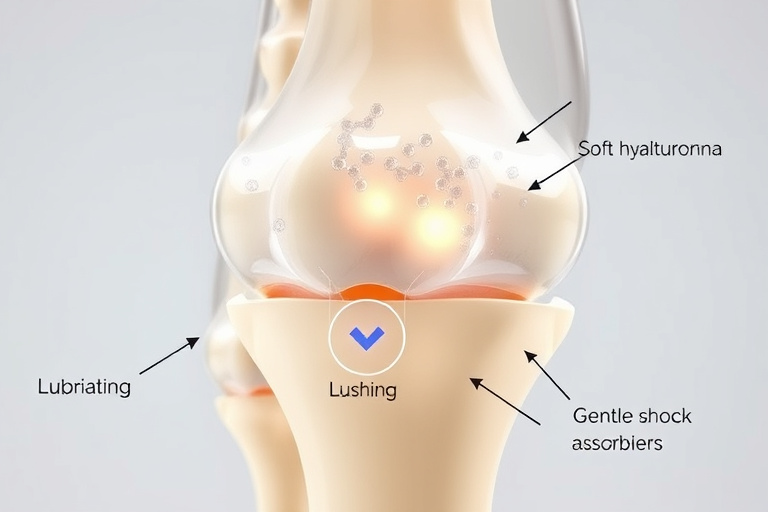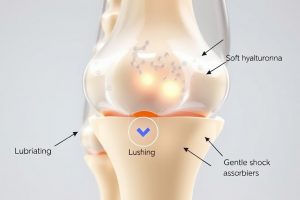Understanding the Role of Hyaluronan in Synovial Fluid and Joint Health
Synovial fluid is a viscous, lubricating substance found within joint cavities. Its primary function is to reduce friction between the articular cartilage of synovial joints during movement, thereby facilitating smooth and pain-free motion. This fluid acts as a cushion, absorbing shocks and distributing loads across joint surfaces.
At the core of synovial fluid’s lubricating properties is hyaluronan, also known as hyaluronic acid. This naturally occurring glycosaminoglycan is responsible for maintaining the viscosity and elasticity of synovial fluid. Hyaluronan molecules form a gel-like network that provides the necessary lubrication and cushioning, essential for joint resilience and mobility.
By supporting the structural integrity of synovial fluid, hyaluronan plays a crucial role in preserving joint function, especially as we age or experience joint stress. Adequate levels of hyaluronan help ensure that joints remain flexible and comfortable during daily activities.
How Hyaluronan Supports Cartilage and Prevents Degenerative Joint Conditions
Research indicates that a decline in hyaluronan levels within synovial fluid is associated with the progression of degenerative joint conditions such as osteoarthritis. As hyaluronan diminishes, the viscosity of synovial fluid decreases, leading to increased friction, cartilage wear, and inflammation.
Hyaluronan contributes to cartilage health by providing a supportive environment that promotes the exchange of nutrients and waste products between cartilage and synovial fluid. It also helps protect cartilage from mechanical stress and reduces the impact of inflammatory processes that can accelerate degeneration.
Numerous studies have shown that supplementing with hyaluronan can improve joint function, reduce pain, and enhance mobility. These benefits are often attributed to the restoration of synovial fluid’s viscoelastic properties, which help cushion joints and slow the progression of degenerative changes.
Methods to Improve Synovial Fluid Hyaluronan Levels: Injections, Supplements, and Lifestyle
There are several approaches to maintaining or increasing hyaluronan levels in joints. One common medical intervention is hyaluronan injections, also known as viscosupplementation. These injections deliver hyaluronan directly into the joint space, providing immediate lubrication and pain relief. They are particularly effective for moderate to severe osteoarthritis cases.
In addition to injections, oral hyaluronan supplements have gained popularity as a non-invasive option. These supplements aim to support the body’s natural production of hyaluronan and improve joint health over time. While research shows promising results, it’s important to choose high-quality products and consult healthcare providers for personalized advice.
Beyond medical treatments, lifestyle factors such as maintaining a healthy weight, engaging in regular low-impact exercise, staying hydrated, and consuming a diet rich in joint-supportive nutrients can influence hyaluronan production and overall joint health.
The Science Behind Hyaluronan Supplements and Joint Genesis Support
Scientific studies have demonstrated that hyaluronan supplementation can positively impact synovial fluid quality and joint function. These supplements may stimulate the body’s own hyaluronan synthesis, leading to improved lubrication and cushioning within the joint.
Biologically, hyaluronan supports joint regeneration by promoting cellular activity involved in tissue repair and reducing inflammation. Its ability to enhance the viscoelastic properties of synovial fluid makes it a valuable component in managing joint discomfort and maintaining mobility.
Generally, hyaluronan supplements are considered safe when used appropriately. However, individuals should discuss their specific health conditions with healthcare professionals to ensure safe and effective use, especially if they are undergoing other treatments or have underlying health issues.
Comparing Medical Interventions and Natural Approaches to Synovial Fluid Support
Hyaluronan injections offer rapid relief and targeted delivery but may require multiple sessions and involve procedural considerations. Conversely, oral supplements provide a convenient, non-invasive option that can support joint health over time. Both approaches have their advantages and limitations, and the choice depends on individual needs and medical advice.
In addition to medical interventions, adopting a joint-friendly lifestyle is essential. Proper diet, regular exercise tailored to joint health, and avoiding activities that cause excessive joint stress can help maintain hyaluronan levels naturally. These practices complement medical treatments and contribute to overall joint resilience.
When considering options for joint support, it is advisable to consult healthcare professionals who can recommend personalized strategies based on the severity of joint issues and individual health status.
Final Thoughts: Does Supporting Hyaluronan in Synovial Fluid Improve Joint Comfort?
Accumulating evidence underscores the vital role of hyaluronan in maintaining healthy, functional joints. Supporting hyaluronan levels—whether through injections, supplements, or lifestyle modifications—can significantly improve joint lubrication, reduce pain, and enhance mobility.
For individuals experiencing joint discomfort or at risk of degenerative conditions, exploring evidence-based options like hyaluronan support is a practical step toward preserving joint health. By understanding the science behind synovial fluid and hyaluronan, you can make informed decisions to maintain joint function and reduce discomfort over the long term.




